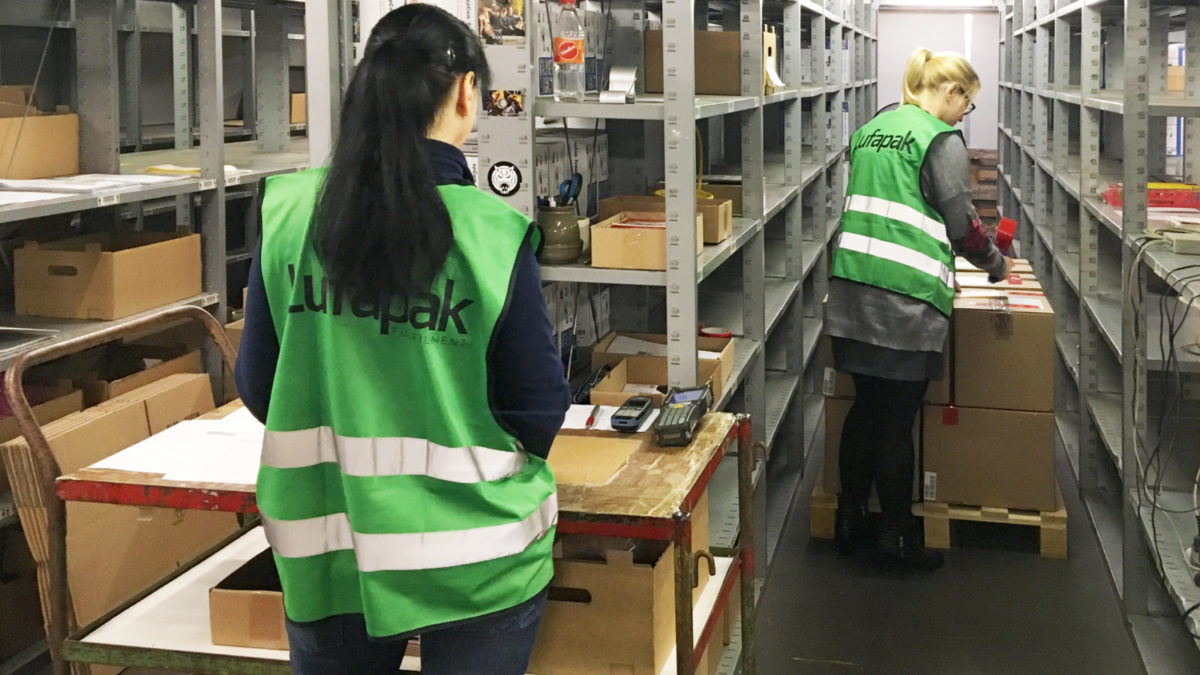sales@lufapak.de +49 2631/384-0 Contactform
Outsourced fulfillment – what it is and why companies should use it
Outsourced fulfillment, also known as third-party fulfillment, refers to the process of outsourcing warehousing, order processing and shipping to an external service provider. Companies use outsourced fulfillment to meet their logistics needs without having to handle the associated tasks internally.
The general flow and process of fulfillment outsourcing:
- Warehousing: The company sends its products to the fulfillment service provider’s warehouse. The latter is responsible for the safe and organized storage of the products.
- Order processing: When a customer places an order, this information is sent to the fulfillment service provider. The service provider is then responsible for picking the right products from the warehouse and preparing them for shipment.
- Packaging: The fulfillment service provider packages the products according to the company’s requirements and the customer’s expectations. This may include adding promotional materials or personalized notes.
- Shipping: the fulfillment service provider takes care of shipping the packaged products to the customers. They often work with different shipping companies to offer a variety of shipping options.
- Returns: Many fulfillment service providers also handle returns and return shipments. They receive returned products, inspect their condition and re-stock them.
The advantages and disadvantages of outsourced fulfillment
Outsourced fulfillment offers both advantages and disadvantages.
Advantages of Outsourced Fulfillment
- Cost savings: Outsourced fulfillment can be cost-effective, especially for companies with high order volumes. They save costs for warehousing, personnel and shipping logistics.
- Time savings: Because an external service provider handles the logistics tasks, companies can focus their time and resources on other aspects of their business.
- Scalability: Outsourced fulfillment service providers can easily scale as a company grows. They often have extensive warehouse capacity and can handle large order volumes.
- Expertise: fulfillment service providers often have years of experience and expertise in logistics. They use efficient systems and technologies to optimize the process and minimize errors.
Disadvantages of Outsourced Fulfillment
- Less control: When outsourcing fulfillment to a third party, the company has less direct control over inventory, the packaging process and shipping.
- Communication: There can be challenges in communication, especially when issues arise. This can lead to delays or errors.
- Brand experience: some companies want to create a specific brand experience that is influenced by the packaging and presentation of their products. With Outsourced Fulfillment, this can be more difficult to achieve.
- Cost: Although outsourced fulfillment is often cost effective, the fees for these services can still be high for some companies, especially if order volumes are low.
Differences between In-house and Outsourced Fulfillment
In-house and outsourced fulfillment are two different methods of managing a company’s logistics needs.
With in-house fulfillment, the company retains full control over all aspects of the process, from storing and packaging products to shipping them to customers.
This approach offers a high degree of flexibility and allows the company to directly influence the customer experience, for example, through customized packaging or special handling of certain products.

However, this approach can also be expensive, as it requires building and maintaining warehouse space, hiring and training staff, and implementing and maintaining ordering and shipping systems.
On the other hand, there is outsourced fulfillment, in which an external service provider is responsible for handling logistics tasks.
This approach can increase process efficiency and accuracy, as these companies typically specialize in fulfillment and have extensive experience and proven systems.
In addition, outsourced fulfillment can often be more cost-effective, especially for companies with high order volumes, as the costs of warehousing, staffing and systems are spread across many customers. However, this also means that the company relinquishes some control over the fulfillment process and the customer experience.
Conclusion on Outsourced Fulfillment
Outsourced fulfillment is a significant topic in e-commerce and offers both advantages and disadvantages. On the positive side, it allows companies to save time and money and focus on their core competencies. It can also help improve the customer experience by enabling fast and efficient deliveries.
Contact us now and get advice


